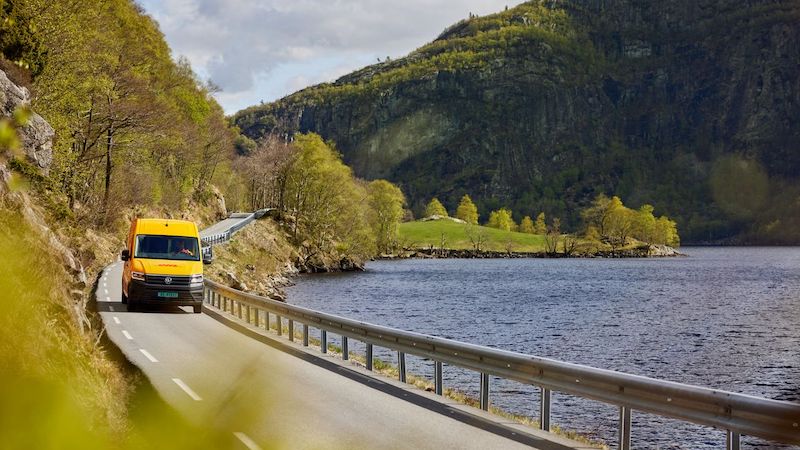Grow your business with the Discover newsletter
Logistics advice & insights straight to your inbox
Subscribe now
In today's rapidly evolving global landscape, it is more important than ever for businesses to prioritise environmental sustainability. In fact, more than half (51%) of 16,000 respondents say sustainability is more important to them today than it was 12 months ago, according to a survey by IBM Institute for Business Value (IBV).
Companies that embrace sustainable practices can enhance their brand image and improve customer loyalty amongst their consumers. Not only that, but adopting environmentally sustainable measures also helps businesses mitigate risks associated with climate change, such as natural disasters and regulatory constraints, ensuring their long-term viability.
A crucial aspect of this endeavour is to reduce the company's carbon footprint.
Carbon footprint refers to the total amount of greenhouse gases (GHGs) emitted directly or indirectly by its activities. These emissions are usually measured in units of carbon dioxide equivalents (CO2e) to account for various types of GHGs, such as methane and nitrous oxide, as well as their differing impacts on climate change.
Carbon footprint is an important indicator of the environmental impact of human activities as GHGs trap heat in the Earth's atmosphere, contributing to global warming and climate change. By measuring and reducing their carbon footprints, businesses can take steps to mitigate their environmental impact and contribute to international efforts to combat climate change.
Besides reducing their carbon footprint, businesses can also consider becoming carbon neutral.
Carbon neutrality, also known as climate neutrality or net-zero emissions, is a state where the total amount of GHG emissions produced by human activities is balanced by an equivalent amount of emissions removed from the atmosphere.
The Intergovernmental Panel on Climate Change (IPCC) has emphasised the need for countries to reach climate neutrality by the mid-21st century to limit global warming to 1.5°C above pre-industrial levels. Achieving this goal is critical in mitigating the most severe consequences of climate change, such as extreme weather events, rising sea levels, and the loss of biodiversity.
Businesses can achieve carbon neutrality by reducing emissions at the source and/or investing in initiatives that capture or offset the remaining emissions.

As one of the world's leading logistics providers, DHL Express Indonesia is committed to helping our customers adopt sustainable practices that benefit the environment and contribute to long-term business success.
Here's how we can support your efforts:
DHL's GoGreen Climate Neutral shipping service allows businesses to offset the carbon emissions generated by their shipments by supporting climate protection projects, such as reforestation and renewable energy initiatives.
DHL calculates, reports, and offsets these GHG emissions following the globally recognised Greenhouse Gas Protocol standard for "Product Lifecycle Accounting and Reporting”.
By offsetting these emissions, businesses can help mitigate the impacts of climate change and contribute to global efforts to reduce GHG emissions. Companies can also demonstrate their commitment to sustainability at the same time.
While offsetting refers to investing in projects that reduce, remove, or capture GHG emissions outside an organisation's direct operations, insetting focuses on initiatives and actions taken within the same entity's supply chain.
DHL’s GoGreen Plus is an insetting service that can help businesses reduce 30% of the carbon emissions associated with their shipments by using sustainable aviation fuel (SAF) instead of traditional petrol for aircrafts.
In addition to offsetting and insetting services, incorporating surcharges into your sustainability strategy can further support your environmental efforts. Surcharges are fees applied to shipping costs to help cover expenses associated with implementing environmentally sustainable practices.
Some common types of surcharges include:
Fuel surcharges: These fees help cover the costs of cleaner and more sustainable fuel options, such as biofuels, which can significantly reduce GHG emissions.
Carbon offset surcharges: These fees contribute to carbon offset projects that help neutralise the emissions generated by your shipments.
Recycling surcharges: These fees support recycling programmes and the proper disposal of packaging materials, reducing waste and promoting a circular economy.
By including these surcharges in shipping costs, businesses can ensure they are actively investing in sustainable practices, enhancing their credibility and attracting environmentally-conscious customers.
DHL Express is also dedicated to providing eco-friendly logistics products and solutions to help green businesses achieve their sustainability goals.
Whether you’re shipping bulky items or small parcels, we offer a range of environmentally-friendly packaging options. They include recyclable materials and reusable packaging to minimise waste and reduce carbon footprint.
Need help figuring out how to pack your products? Here are some packing tips for businesses in Indonesia to follow.
We also provide comprehensive carbon reporting services (additional surcharges applied), allowing you to track and monitor the emissions associated with your shipments. This also makes it easier to identify areas for improvement and set sustainability targets.
Our environment experts can help you develop and implement a comprehensive sustainability strategy tailored to your unique business needs.
Tap on our extensive experience and access a range of sustainable logistics solutions to make a positive difference in the environment. Partner with DHL Express and drive long-term success for your business in Indonesia. Open a business account with us today.